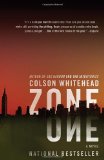Summary | Excerpt | Reviews | Beyond the Book | Readalikes | Genres & Themes | Author Bio

A Novel
by Colson Whitehead
This was the fourth day of rain, Friday afternoon, and a conditioned part of him submitted to end-of-the-week lassitude, even if Fridays had lost their meaning. Hard to believe that reconstruction had progressed so far that clock-watching had returned, the slacker's code, the concept of weekend. It had been a humdrum couple of days, reaffirming his belief in reincarnation: everything was so boring that this could not be the first time he'd experienced it. A cheerful thought, in its way, given the catastrophe. We'll be back. He dropped his pack, switched off the torch in his helmet, and pushed his forehead to the glass as if he were at his uncle's, rearranging the architecture into a message. The towers emerged out of smudged charcoal, a collection of figments and notions of things. He was fifteen floors up, in the heart of Zone One, and shapes trudged like slaves higher and higher into midtown.
They called him Mark Spitz nowadays. He didn't mind.
Mark Spitz and the rest of Omega Unit were half done with 135 Duane Street, chugging down from the roof at a productive clip. All clear so far. Only a few signs of mayhem in the building. A ransacked petty cash drawer on eighteen, half-eaten takeout rotting on scattered desks: superannuated currency and the final lunches. As in most businesses they swept, the offices had shut their doors before things completely deteriorated. The chairs were snug at their desks, where they had been tucked by the maintenance crew on their last night of work, the last sane evening in the world, only a few askew and facing the doors in trample-exit disarray.
In the silence, Mark Spitz signed off on a rest period for himself. Who knew? If things had been otherwise, he might have taken a position in this very firm, once he completed the obstacles attendant to a law degree. He'd been taking prep classes when the curtain fell and hadn't worried about getting in somewhere, or graduating or getting some brand of job afterward. He'd never had trouble with the American checklist, having successfully executed all the hurdles of his life's stages, from preschool to junior high to college, with unwavering competence and nary a wobble into exceptionality or failure. He possessed a strange facility for the mandatory. Two days into kindergarten, for example, he attained the level of socialization deemed appropriate for those of his age and socioeconomic milieu (sharing, no biting, an almost soulful contemplation of instructions from people in authority) with a minimum of fuss. He nailed milestone after developmental milestone, as if every twitch were coached. Had they been aware of his location, child behaviorists would have cherished him, observing him through binoculars and scratching their ledgers as he confirmed their data and theories in his anonymous travails. He was their typical, he was their most, he was their average, receiving hearty thumbs-ups from the gents in the black van parked a discreet distance across the street. In this world, however, his reward was that void attending most human endeavor, with which all are well acquainted. His accomplishments, such as they were, gathered on the heap of the unsung.
Mark Spitz kept his eyes open and watched his environment for cues, a survivalist even at a tender age. There was a code in every interaction, and he tuned in. He adjusted easily to the introduction of letter grades, that first measure of one's facility with arbitrary contests. He staked out the B or the B chose him: it was his native land, and in high school and college he did not stray over the county line. At any rate his lot was irrevocable. He was not made team captain, nor was he the last one picked. He sidestepped detention and honor rolls with equal aplomb. Mark Spitz's high school had abolished the yearbook practice of nominating students the Most Likely to Do This or That, in the spirit of universal self-esteem following a host of acrimonious parent-teacher summits, but his most appropriate designation would have been Most Likely Not to Be Named the Most Likely Anything, and this was not a category. His aptitude lay in the well-executed muddle, never shining, never flunking, but gathering himself for what it took to progress past life's next random obstacle. It was his solemn expertise.
Excerpted from Zone One by Colson Whitehead. Copyright © 2011 by Colson Whitehead. Excerpted by permission of Doubleday, a division of Random House, Inc. All rights reserved. No part of this excerpt may be reproduced or reprinted without permission in writing from the publisher.




Every good journalist has a novel in him - which is an excellent place for it.
Click Here to find out who said this, as well as discovering other famous literary quotes!
Your guide toexceptional books
BookBrowse seeks out and recommends the best in contemporary fiction and nonfiction—books that not only engage and entertain but also deepen our understanding of ourselves and the world around us.